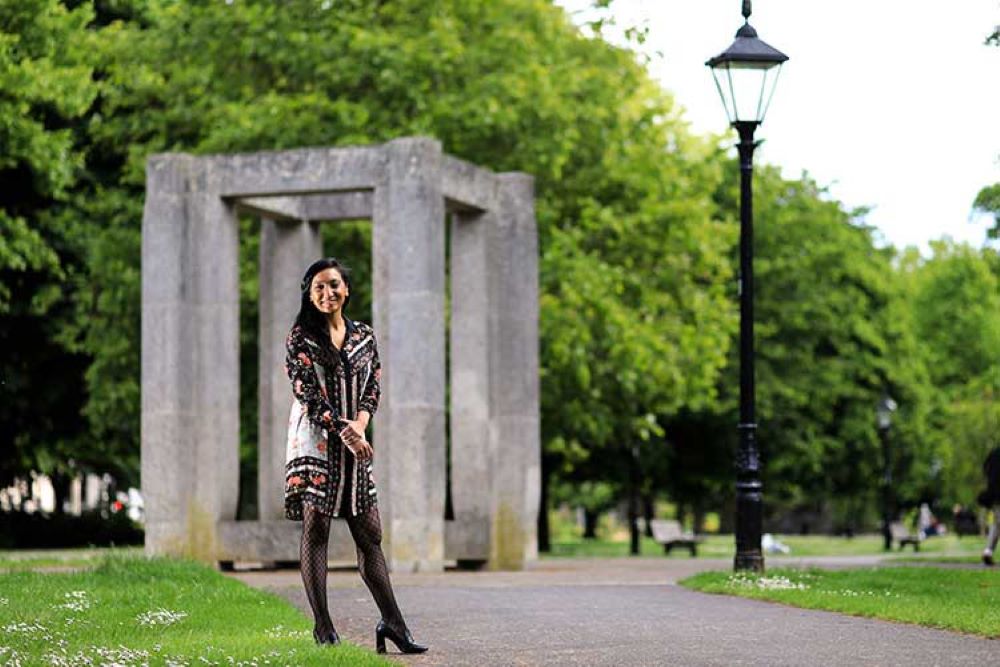Words by Sally Churchward. Pictures by Chris Moorhouse.
Following the local elections on May 5, 2022, the Labour Party took control of Southampton City Council. Satvir Kaur, the council’s new leader, reflects on her journey from Southampton’s inner city to being in charge of her home city, becoming the first person of colour in the role in Southampton, and the first Sikh woman to lead a council anywhere in the country.
Satvir Kaur, the new leader of Southampton City Council, addresses the chamber, her confident voice ringing out across the room.
It’s quite the journey for the girl who used to routinely get in trouble in English class for using slang.
Not that she was ever deliberately being disrespectful, disruptive or whatever it was about her choice of words that drew rebuke (and it’s debatable whether rebuke was appropriate).
It was just the normal language she was used to using in the classroom, commonplace at her previous school – the culturally diverse Mount Pleasant Juniors – close to her home in Oxford Avenue and her family’ sari shop, in one of the country’s most deprived wards, Bevois.
Satvir was the only child from her year at Mount Pleasant to go on to St Anne’s Catholic School, and one of only a handful of ethnic minority students in the whole school. As a working class Sikh girl, it was something of a cultural shock to her, but, in a pattern to be repeated in her life, she forged her own path and went on to become elected as head girl, her first of many election wins, and becoming the school’s first non-Catholic student to hold the position.
Now, Satvir finds an election win leading her to two more firsts – after the Labour Party took back control of Southampton City Council at the start of May, following a year under a Conservative administration. She has become the first person of colour to lead Southampton City Council, and the first Sikh woman to lead a council anywhere in the country.
She wishes that it wasn’t noteworthy, that there were plenty of other people of colour, and of diverse religions and backgrounds, holding political office in the country. But she recognises that at the moment, she is unusual and hopes she can inspire other girls, people of colour, kids from inner cities, and others who might otherwise feel they don’t fit the idea of what a politician is to follow a similar path.
“I didn’t know until after the election that I was these firsts,” she says. “Being the first at anything can feel overwhelming, but I’m also incredibly honoured. I would prefer to be in a place where it wasn’t a thing, for it to be common for people of colour to be in positions of responsibility. But I am really happy to be able to say ‘if I can do it, so can you’.
“Equal opportunity doesn’t mean equal access to opportunities. People growing up from different backgrounds have different assumptions about what they can achieve and it’s up to us to give them opportunities and to open doors.”

In Satvir’s community there were very strong expectations about what girls would do when they grew up, and running a city council was about as far as you could get from them.
The youngest of five, with one older brother and three sisters, she grew up in a traditional household, where girls were expected to learn to cook, stay at home and enter into an arranged marriage with a stranger from the Punjab. Two of Satvir’s older sisters went to university. She followed, studying history and politics at the University of Southampton, before going on to study law at Solent University.
“My parents were the first in our community to send their daughters to university,” she adds. “We used to push cultural boundaries and were lucky to have parents who wanted to educate their children, regardless of whether that was their son or their daughters.
“They wanted us to have the best opportunities and not to have our futures depend on our husbands. After my sisters and I went to university, other parents from our community started sending their daughters too.”
Satvir’s family were already well-known locally. They ran a sari shop in St Mary’s Road, and she spent much of her time helping out there, as well as travelling the country at the weekends to help her father on his market stall.
She says the ‘trader’s shout’ she cultivated on the family stall can still come in handy in the world of politics.
“I felt at the time, and still do, that local shops like the one we had are the beating heart of a local community,” she says. “Our customers felt like part of our family. They would often come in, not to shop but just to chat. I would listen to people’s stories, their problems and really got to know a wide range of people.”
The family business, which closed in 2018 when Satvir’s father passed away, primed Satvir for a varied employment life. Her first paid job was at Shoe Express and she was a ‘Sunday girl’ at Debenhams.
It was here she met her good friend Anita Dhanecha, with whom she would go for Mr Whippy ice creams at Mayflower Park and who introduced her to volunteering at Relate.
“We clicked instantly,” says Anita. “For as long as I’ve known Satvir, she’s had a passion for politics. She’s really hard working and I know she will do everything she can to make Southampton a better city.”
Meanwhile, Satvir met her fiance Ben, who she is marrying this summer, through her political activities. She describes him as ‘crazy supportive’, adding “he’s always pushing me to be my best.”
Satvir also worked in admin at a local school, and for an international media company in London doing advertising and marketing.
But it was in politics that she found her calling in life.
Satvir’s family were always proud Labour voters, but while she was interested in politics and the way the world works, she wasn’t involved in party politics directly until a chance meeting with a local MP.
“Lots of teenagers want to go out with their mates drinking, but I liked to sit with my dad and watch the news,” she laughs.
“I was always interested in how laws, and things like that, changed people’s everyday lives. I found it fascinating. That’s what made me want to study history and politics. I’m a firm believer that if we don’t learn from history, we risk repeating it. I’ve always been fascinated by how history has helped shape today, and how today helps shape tomorrow.”

Satvir took the step into party politics when she met the then local MP John Denham, whilst she was stewarding at a Sikh festival.
“My dad got chatting to John Denham,” she continues. “He told him about me studying politics, then grabbed me and introduced me. John Denham was a local celebrity. He and Alan Whitehead had been representing Southampton for years. I even had a photo of him presenting me with first prize for fancy dress at school when I was seven!
“This was just before the 2010 election and he asked if I wanted to help out with his campaign and took my details. I was so excited that an MP had taken my details! Then I got a call a couple of weeks later to ask if I was free for an event on the Monday.
“It was the day Gordon Brown, who was Prime Minister at the time, was coming to Southampton, and they wanted some young people to meet him at the train station. So on my first day of doing anything for the Labour Party, I got to meet the Prime Minister, which was such a privilege!”
Satvir got involved with John Denham’s election campaign, talking to people on their doorstep. That election saw John Denham win his seat by just 192 votes, which made Satvir realise how significant her efforts, and those of other campaigners, had been.
“The penny dropped for me that as an individual you can make a real difference in politics,” says Satvir. “I felt that we’d taken John over the line and I realised that your contribution really can make a difference. I got more into it and fell in love with talking to people on their doorstep. It became my source of energy.
“I think that some people in politics can get obsessed with titles and talking to so called ‘important’ people, but for me, politics is all about the people on the doorstep! When you’re in politics, you have to deal with a lot of grief and hate, and talking to ordinary people, who you can help, keeps you going.
“Some people, if they have a bad day, have a glass of wine. I organise a canvassing session!” she laughs.
Those around her were soon to spot Satvir’s passion and talent. A friend from the campaign office texted her to ask if she had considered being a councillor, to which she replied ‘I think you’ve sent this to the wrong person’, receiving the response ‘No Satvir, I meant you!’
But Satvir wasn’t sure.
“People like me don’t do things like this, but a lot of people really encouraged me,” she says. “It was a combination of factors: being from an ethnic minority, being a woman and being working class. I didn’t see people like me in roles like that. I didn’t think that world belonged to people like me.
“I didn’t believe that people like me could make a difference. That’s why I’m so keen on proper representation.”
Satvir stood in what was thought to be a safe Conservative ward, in Shirley, and was amazed and delighted to win a seat on Southampton City Council.
“People who aren’t councillors often don’t really know what councillors do, partly because it depends so much on where you represent and how you do the role,” she says. “Once elected, you can find out that it’s your vocation, or you can really hate it. You can be dealing with people who really dislike you or who are upset that you can’t just click your fingers and fix their problem.
“I know people who have realised that it’s not for them, but for me, I absolutely felt I’d found my home. I felt so lucky that by my mid 20s, I’d found my reason for being here.
“I love being able to help people and improve my city.
“The year after I was elected, Labour took control of the City Council, and it just felt like such an incredible honour and privilege to be able to do what is best for your city and I’ve loved it ever since.”
Satvir adds that she didn’t set out to rise up the local political ladder, but always gravitated towards roles that allowed her to make more positive changes. In addition to her role on the council, she continues to mentor young women and is chair of the governors at her old primary school (Maytree Infants) and a governor at her old junior school (Mount Pleasant) and Richard Taunton Sixth Form College.
She is keen to use her experiences and platform to make the path she has walked easier for others from less privileged backgrounds.
“There are children who are sent to the best schools, are supported by their parents and who have all the confidence in the world,” she says. “It doesn’t mean that an inner city kid of colour is any less capable. It’s just that they’ve had fewer opportunities and may be less confident.
“It’s up to us to let them see that they can be our next leaders, run the BBC, Southampton City Council or whatever else.”
Satvir feels supporting and mentoring young people is hugely important in levering positive change.
“There’s real power in someone being able to relate to you and you showing them an opportunity,” she says.
For Satvir, she will always be grateful for the opportunities presented to her by her parents who, while they still had a pull towards the traditional, wanted and offered more for their daughters.
She describes her late father as her ‘hero’ and is very saddened that he didn’t live to see her take on her current role.
“He’s the main reason why I’m in politics,” she says fondly.
“He was head of the family, and every time someone would say ‘why is she not married’, he would be first to defend me, and say ‘It’s OK, she’s married to politics’. If I felt deflated by the old white men who dominated politics, he would say ‘You can do anything. That could be you one day’.
“I wish he was here to experience this with me. I hope he would he proud. He always said to me ‘you need to believe it before it can happen’.

“My mum’s always been proud of me too, but she’s also been cautious. She’d say ‘We’re really proud of you, but things like this don’t happen to people like us’. She was trying to protect me from the hatred and difficulties I would face’.
“My mum would say ‘Do be careful’ while my dad would say ‘Take on the world, you can do anything’.”
Arguably, both her parents were right. Satvir has risen swiftly through local politics and there’s no telling where her political journey may take her next, but she has also had to face difficulties and hatred.
She has been sworn at, spat at, told to go back where she comes from and threatened with a hammer in her face. She’s been shaken but then strengthened her resolve.
“It does make you question why you do what you do, but my therapy is talking to people on their doorsteps,” she says.
“If all the women, people of colour, or working class people, gave up when they faced hatred, we wouldn’t be able to achieve anything.”
For Satvir, she has a determination to make real change and the strength of a strong community background to draw on and keep her going.
“People can think it’s terrible to grow up in a deprived area, but I loved where I grew up,” she says. “It taught me so much about life and community. There’s real strength in coming together and helping each other.
“My politics is very bottom up. We should work with communities, not just for them. We need to go on a journey together.”
Looking around her new office in Southampton’s Civic Centre Satvir admits: “I do sometimes get a bit of imposter syndrome, sitting here in this big office I have now. But, as I see it, my job is to spend as little time as possible in this nice shiny office.
“The world we live in is not equal, but we should all work together to make it fairer. I’m honoured to be leader of the council but I do feel the huge weight of trust that people have placed in me.“I would never take that for granted.”
- Can you help our funding appeal? We rely on donations from readers to keep In Common running. Could you help to support In Common, for as little as 25p a week? Please help us to keep on sharing stories that matter with a monthly donation. Visit: https://www.patreon.com/incommonsoton


